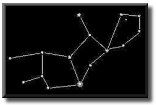

Virgo is known by a couple of other names: Astraea and Dike, although the name more commonly associated with her is Astraea. This name means "star maiden," appropriate since she dwells among the stars in the constellation Virgo. Astraea "…is Justice, a great goddess worshipped by all and denied by no one" (Parada).
Astraea hails from pretty important people. Her father is the great Zeus, who needs no introduction. Her mother is Themis, "A daughter of Uranos and Gaea…" (Murray 127). She is "…the personification of that divine law of right which ought to control all human affairs, of that highest and noblest sense of right which is subject to no human influences" (Murray 127).
Astraea was among the gods dwelling on the earth during the Golden Age of man. When the Golden Age gave way to the Silver Age, Astraea became concerned for humanity. "Behold what manner of race the fathers of the Golden Age left behind them! Far meaner than themselves! but you will breed a viler progeny! Verily wars and cruel bloodshed shall be laid upon them" (Parada). However, despite her warning, the Silver Age gave way to the Bronze Age, an age of such horrible men that the gods left earth to reside on Olympus. Astraea was the last to leave, choosing her residence among the stars.
After her departure, Zeus, being very disgusted with the Bronze Age, completely destroyed them with a flood. Two people did survive, Deucalion and Pyrrha, and they were the beginning of a different age of man.
Murray, Alexander S. Who’s Who in Classical Mythology: A Classic Guide to the Ancient World. New York: Wings Books, 1988.
Parada, Carlos. Greek Mythology Link. 27 September 2000. http://has.brown.edu/~maicar/Dike.html.